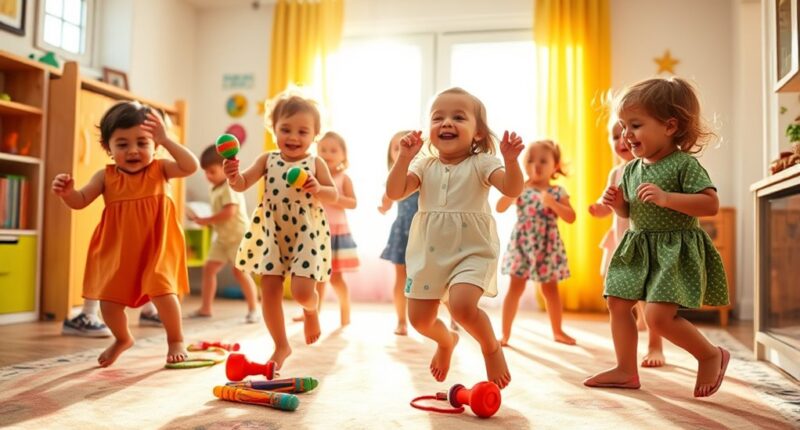Music and movement are key in boosting your toddler’s cognitive development. Engaging with songs and rhythms enhances memory and language skills, while action songs promote physical coordination. Movement activities also develop spatial awareness, aiding in body exploration. Plus, these experiences foster social skills through collaborative play. By incorporating music into early education, you can spark creativity and provide your child with a strong foundation for learning. Discover more ways to enrich your toddler’s development with music and movement.
Key Takeaways
- Engaging toddlers in music and movement activities enhances memory and cognitive skills through neural connectivity and repetitive patterns.
- Repetitive songs and action movements promote language development and vocabulary acquisition in a fun, engaging environment.
- Movement activities like dance and yoga improve gross motor skills and spatial awareness, essential for physical and cognitive growth.
- Music-based activities stimulate multiple senses, boosting cognitive flexibility and adaptability in toddlers.
- Collaborative musical experiences foster social skills, teamwork, and creative expression, enriching early educational experiences.
The Role of Music in Memory Enhancement
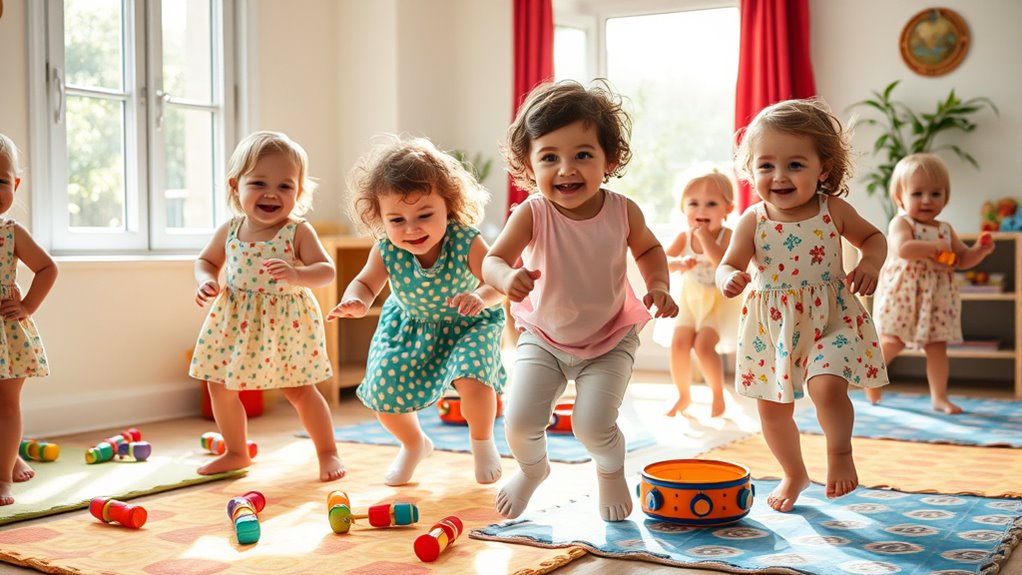
When you expose toddlers to music, you’re not just entertaining them; you’re actively boosting their memory and cognitive skills. Music enhances neural connectivity, essential for forming memory pathways. Research has shown that music education can significantly contribute to a child’s cognitive development. Additionally, the use of natural language processing in educational tools can further enhance the learning experience by providing personalized feedback and support. Moreover, predictive modeling can be utilized to identify effective music-based interventions that promote cognitive growth in young learners.
When children listen to diverse musical styles, their brain cells create connections that improve attention and memory. Repetitive songs and rhythms reinforce these pathways, making it easier for toddlers to retain and recall information. This repetition helps them recognize patterns, which is significant for problem-solving. Furthermore, the thrill of exploration in music can encourage toddlers to express themselves creatively, further enhancing their cognitive abilities.
In addition, structured music activities promote cognitive flexibility, allowing your child to adapt to new challenges. By engaging in musical experiences, you’re fostering holistic growth, integrating both cognitive and emotional development, which lays a strong foundation for their future learning. Furthermore, engaging with music can enhance emotional regulation, which supports better decision-making and coping strategies in children.
Language Development Through Rhymes and Songs
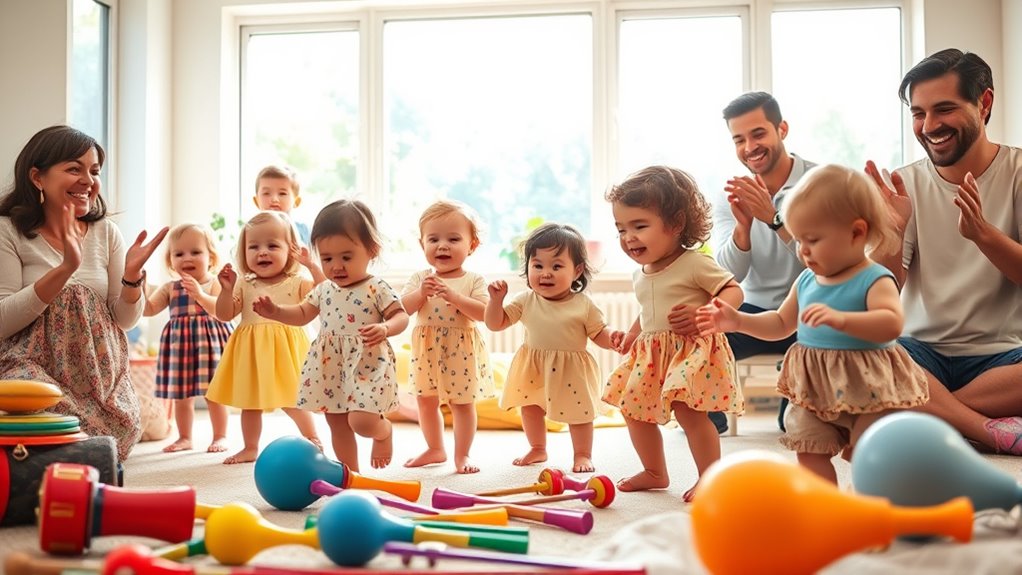
Language development in toddlers flourishes through the use of rhymes and songs, as these musical elements create an engaging environment for learning. When you sing repetitive songs, your child can easily remember words and phrases.
Nursery rhymes introduce new vocabulary in a fun way, while action songs like “The Wheels on the Bus” teach body parts through gestures. Rhyming enhances phonological awareness, essential for early literacy, and can also promote healthy breakfast choices, which are crucial for maintaining energy levels during playtime. Additionally, using color accuracy in visuals during musical activities can further enhance the learning experience. Engaging with music can serve as a transformative tool for personal growth and cognitive development in young children. Regular exposure to hydrating face masks can also support skin health, ensuring toddlers are comfortable and ready to learn.
Songs like “Old MacDonald” expand vocabulary by teaching animal sounds, and “Head, Shoulders, Knees, and Toes” reinforces body part recognition. Engaging with music encourages active participation, helping toddlers express emotions and manage feelings. Additionally, incorporating frozen yogurt into playtime can create a sensory experience that further stimulates language and cognitive skills.
Movement Activities and Spatial Awareness

Movement activities play an essential role in enhancing toddlers’ spatial awareness, as they engage children in exploring their bodies and surroundings. Activities like “Simon Says” teach body positioning and spatial distancing, while sports such as soccer develop coordination and awareness of space. Incorporating the power of imagination into these activities can further enhance creativity and problem-solving skills. Additionally, engaging in best daisy varieties can inspire themes for movement games that highlight colors and shapes in nature.
Yoga promotes mindfulness and enhances spatial skills, too. Providing padded playpens or outdoor spaces encourages exploration, fostering cognitive growth. Engaging with blocks and puzzles helps toddlers understand shapes and spatial relationships, while tools like Montessori Busy Books can further enhance cognitive development through interactive play. Furthermore, incorporating sensory toys can provide tactile experiences that support cognitive development and emotional regulation. Additionally, maze worksheets improve hand-eye coordination and spatial reasoning. By integrating movement with play, you not only boost their physical abilities but also lay a strong foundation for future cognitive achievements, making learning both fun and effective. It is crucial to recognize that environmental interactions shape individual development, influencing how toddlers engage with movement activities.
Sensory Stimulation and Cognitive Flexibility
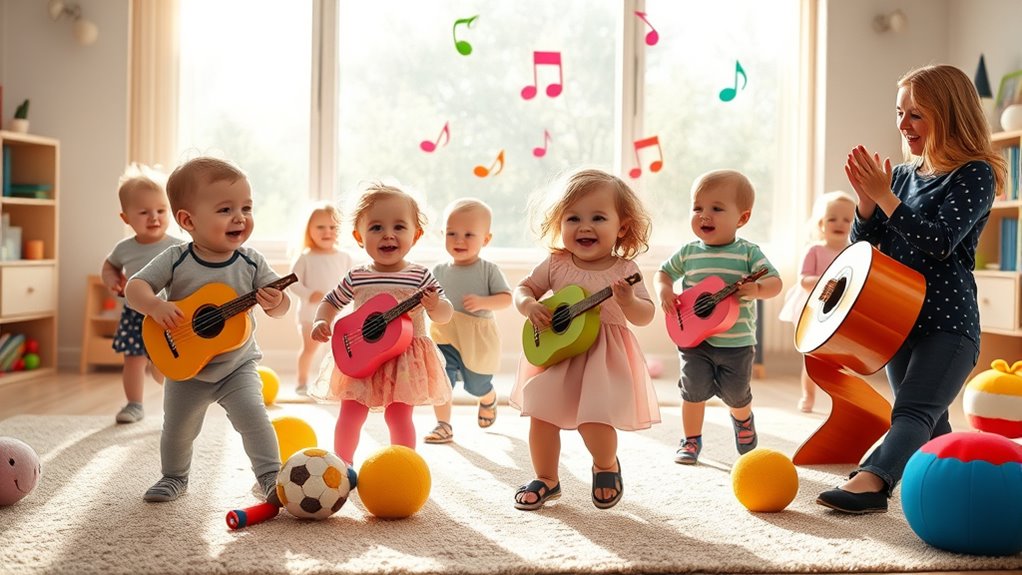
While engaging in music and movement activities, toddlers experience a rich blend of sensory stimulation that greatly boosts their cognitive flexibility.
These activities combine visual, auditory, and tactile elements, sparking brain development and enhancing memory, attention, and language skills. As toddlers switch between different tasks during music sessions, they practice adapting to new information and rules, strengthening their cognitive flexibility. Research shows that prolonged exposure to music training greatly improves this skill, especially as they approach ages four to five. By providing immediate sensory feedback, these activities help children refine their cognitive processes, promoting holistic development. Additionally, practicing stress management techniques through movement can further enhance their emotional regulation and cognitive capabilities. Engaging in these activities can also support mental health by reducing anxiety and improving overall well-being. Moreover, high levels of cultural intelligence can foster collaborative play and social interactions among toddlers, enriching their learning experiences.
Incorporating music and movement into daily routines creates an engaging environment that supports their cognitive growth effectively.
Integrating Music Into Early Education
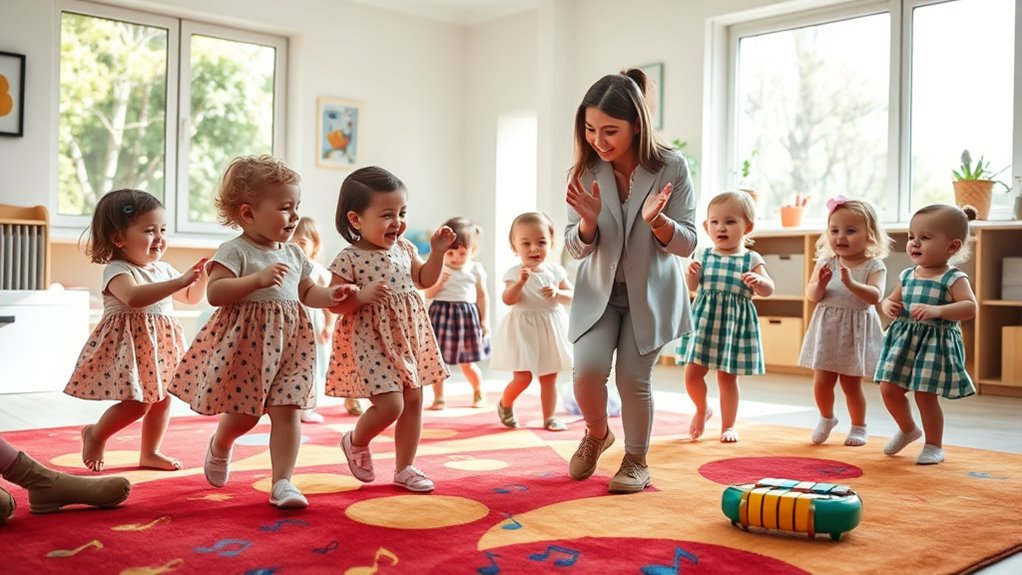
Music plays an essential role in early education, enriching the learning experience for toddlers in numerous ways. By integrating music into your lessons, you can enhance language development, as melodies mimic the rhythm of speech, boosting phonemic awareness. Additionally, intelligent tutoring systems can provide personalized learning experiences that complement musical activities.
Engaging in music-based activities also sharpens cognitive skills like memory and attention, vital for academic success. Through collaborative musical experiences, toddlers develop social skills, learning the importance of teamwork. Additionally, diversification in musical activities can further stimulate various areas of development. Research shows that listening to classical music can improve focus and concentration during tasks, making it a valuable addition to early education.
Incorporating movement and dance fosters gross motor skills, while storytelling with music deepens narrative comprehension. DIY instrument projects ignite creativity and fine motor skills. Additionally, incorporating essential oils for cognitive support can create a calming environment that further enhances focus and learning.
Long-Term Benefits of Musical Exposure
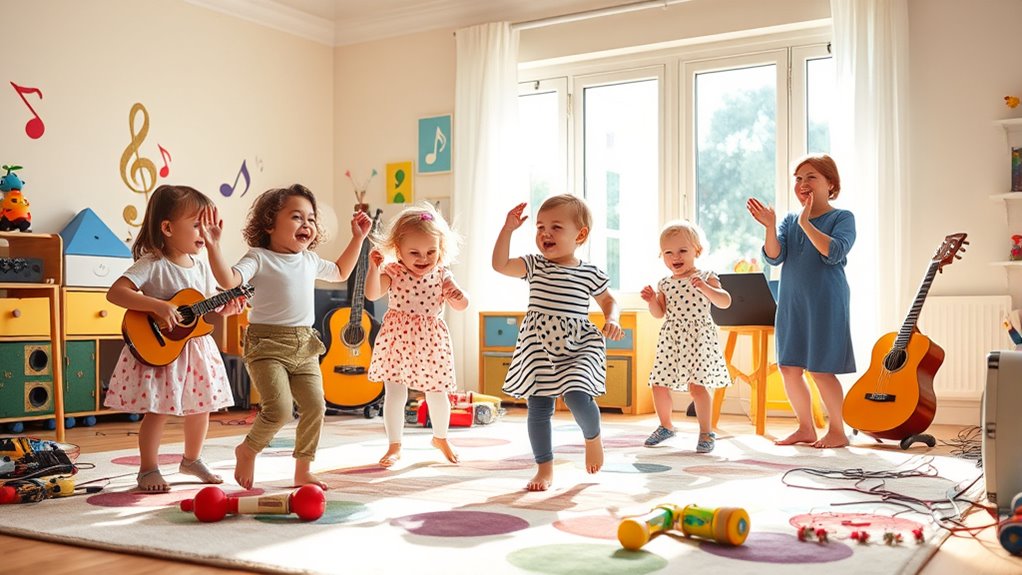
As you expose toddlers to music during their formative years, you’ll likely witness a range of long-term benefits that extend far beyond mere enjoyment. Engaging with music enhances their language acquisition, reading skills, and overall academic performance.
You’ll notice improved cognitive skills like memory and attention span, which are linked to early musical training. Additionally, music fosters motor skills and coordination through movement activities. It also aids in developing executive functions, essential for planning and problem-solving.
As they grow, the cognitive benefits can lead to increased IQ and better test scores. Ultimately, early musical exposure builds strong neural pathways, supporting lifelong learning and adaptability, ensuring your child thrives both academically and socially.
Frequently Asked Questions
How Can I Incorporate Music Into Daily Routines for Toddlers?
You can easily incorporate music into daily routines for toddlers by playing simple nursery rhymes during breakfast or bath time.
Use songs to make changes fun, like singing while cleaning up toys.
Engage them with interactive rhythm games during playtime, or incorporate musical storytelling during story time.
Let them explore instruments, encouraging creativity while they learn.
Regularly including music creates a joyful atmosphere and helps develop their cognitive skills naturally throughout the day.
What Types of Music Are Best for Toddler Development?
When choosing music for toddler development, opt for classical tunes, children’s songs, and simple action songs.
Classical music can help with focus, while nursery rhymes introduce rhythm and language skills. Action songs encourage movement, enhancing motor skills.
Instrumental music sparks creativity. Incorporating repetitive melodies aids memory and vocabulary growth, making learning fun.
Don’t forget to include diverse styles to foster cultural awareness and emotional intelligence, enriching your toddler’s experience.
How Much Music Exposure Is Recommended for Toddlers?
For toddlers, regular music exposure is key, and even short, daily sessions are beneficial. You don’t need long hours; just incorporate music into everyday routines, like mealtime or playtime.
Aim for consistency rather than quantity to enhance their engagement. It’s also essential to tailor activities to their attention spans, which are typically short.
A variety of genres can keep things interesting and broaden their musical understanding without overwhelming them.
Are There Specific Movement Activities That Enhance Cognitive Skills?
Yes, there are specific movement activities that can enhance cognitive skills. Engaging in activities like running, throwing, or dancing improves your coordination and spatial awareness.
You can also try obstacle courses, which challenge problem-solving abilities. Simple games like “Simon Says” foster listening and focus.
Incorporating rhythmic movements or even dancing to music can stimulate creativity and critical thinking. These activities not only sharpen cognitive skills but also make learning fun and interactive for you.
How Can Parents Support Musical Learning at Home?
Imagine your home transforming into a lively concert hall! You can support musical learning by incorporating music into daily routines, like singing during meal prep or dance breaks.
Actively join in by singing, dancing, or playing instruments together. Choose engaging songs that resonate with your toddler, and encourage them to explore different instruments.
Create fun music games and host family jam sessions to make learning enjoyable and strengthen your bond through shared musical experiences.
Conclusion
Incorporating music and movement into your toddler’s routine isn’t just fun; it’s a powerful catalyst for cognitive growth. Picture your little one dancing freely, laughter spilling over as they sing and sway—each note and step weaving a tapestry of memory, language, and awareness. By embracing these joyful experiences, you’re not just nurturing their development today; you’re laying the foundation for a lifetime of learning and creativity. So, let the music play and watch them flourish!
